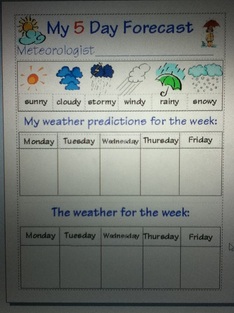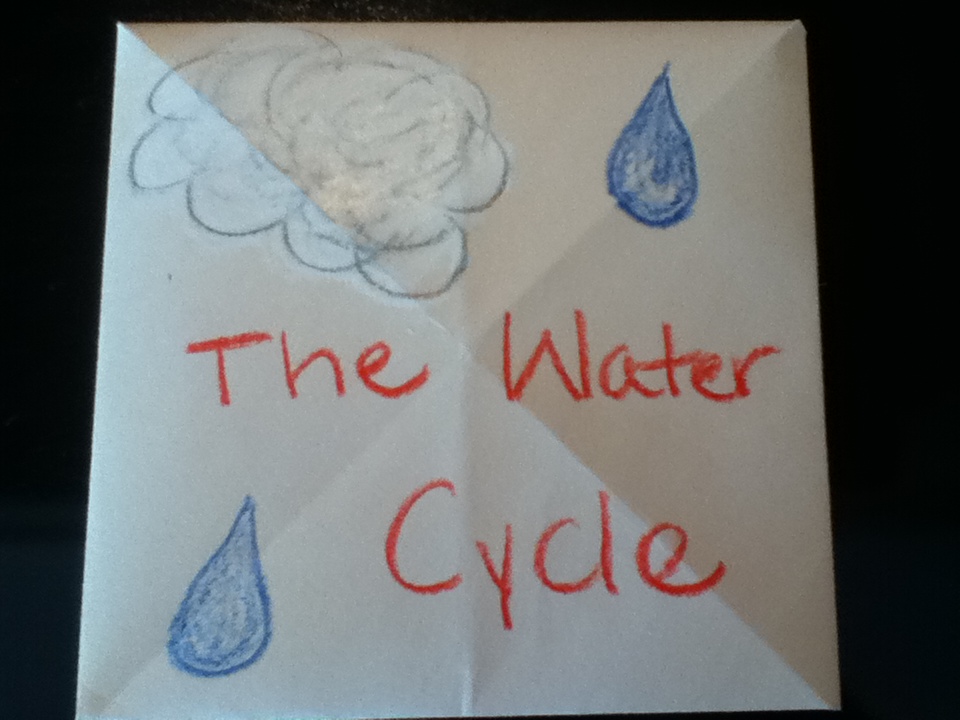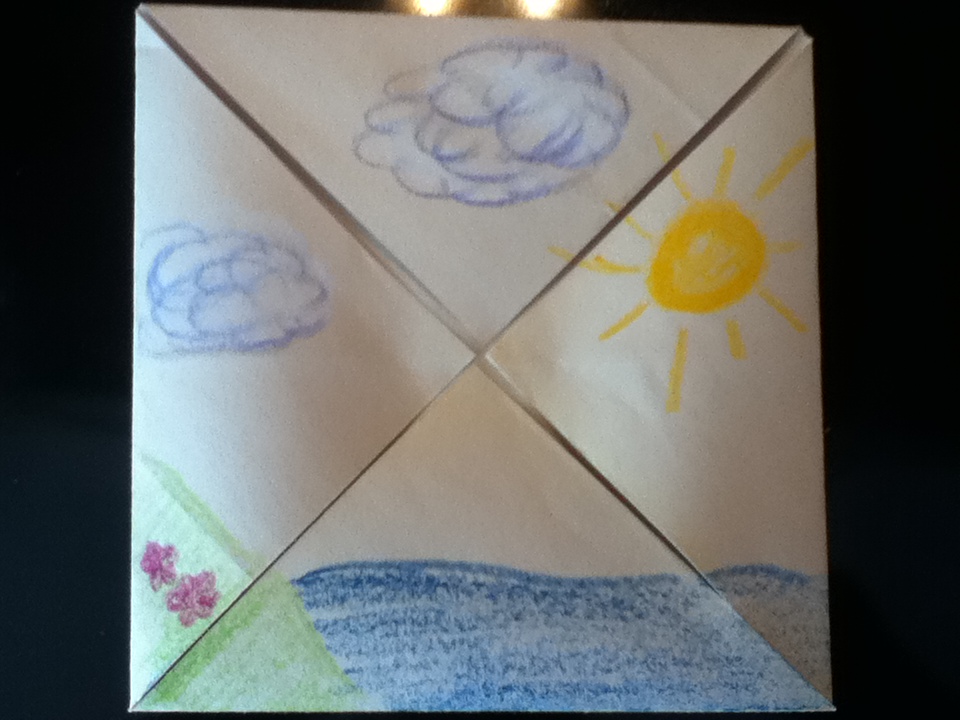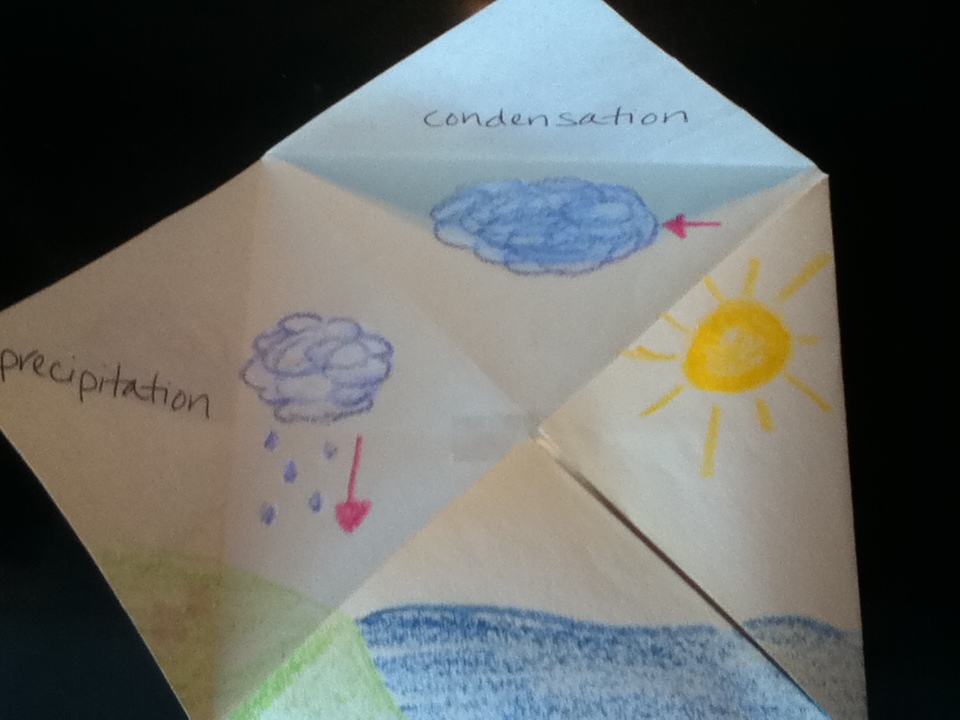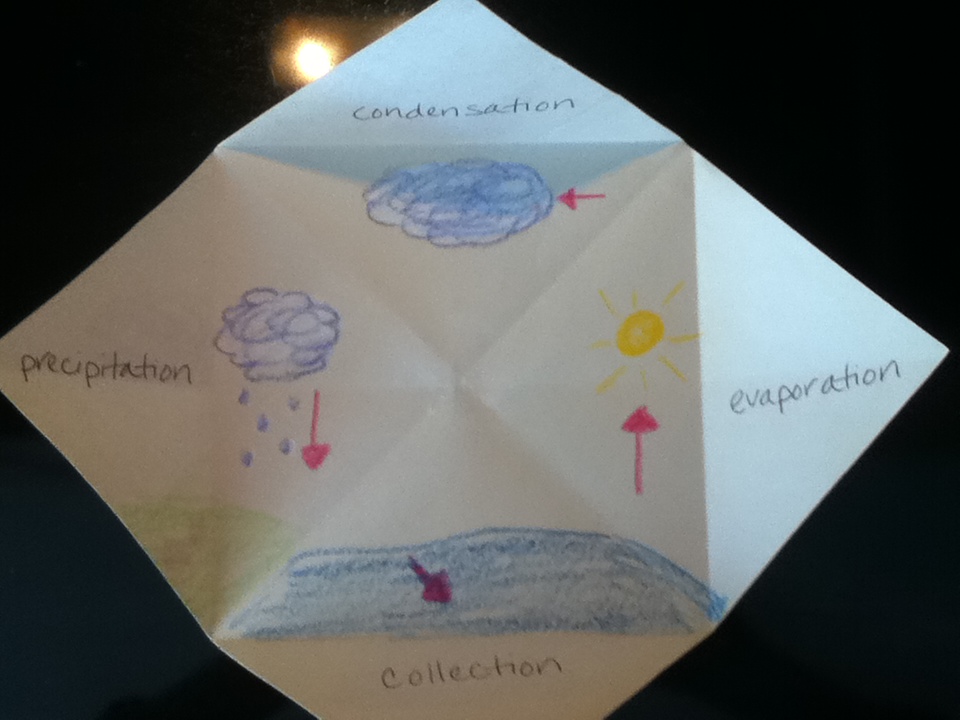Day 5: Weather Forecasting
Objectives:
Students will
Materials:
1 sheet of white (or light) construction paper per child
crayons
scissors
"My 5 Day Forecast" worksheet
interactive science notebooks
Instructions:
Ask students if they know what type of job a Meteorologist performs. Make a list (or a concept map) of everything that the students know about Meteorologists and/or meteorology. Why is the study of weather important to our daily lives? Explain to students that you are going to try to be meteorologists over the next few day by observing the weather (rather than just clouds as they did last week), recording their findings and predicting future weather patterns.
Hand each student a "My 5 Day Forecast" worksheet (see below). Have each child attach this worksheet on the right side of the next available page in his or her interactive notebook. Now take the children outside (or to a window) and have them observe and record what they see in terms of the daily weather. Have students predict what the weather will be like in the days ahead and write their predictions in the Tuesday-Friday sections of the worksheet.
Students will
- observe and record daily weather conditions, such as sunny, cloudy, windy, rainy, or snowy
- describe weather in terms of temperature, wind, and precipitation
- observe and describe precipitation in terms of evaporation and condensation of water
- describe how tracking weather data over time helps scientists make future weather predictions
Materials:
1 sheet of white (or light) construction paper per child
crayons
scissors
"My 5 Day Forecast" worksheet
interactive science notebooks
Instructions:
Ask students if they know what type of job a Meteorologist performs. Make a list (or a concept map) of everything that the students know about Meteorologists and/or meteorology. Why is the study of weather important to our daily lives? Explain to students that you are going to try to be meteorologists over the next few day by observing the weather (rather than just clouds as they did last week), recording their findings and predicting future weather patterns.
Hand each student a "My 5 Day Forecast" worksheet (see below). Have each child attach this worksheet on the right side of the next available page in his or her interactive notebook. Now take the children outside (or to a window) and have them observe and record what they see in terms of the daily weather. Have students predict what the weather will be like in the days ahead and write their predictions in the Tuesday-Friday sections of the worksheet.
Next, ask the children how they think rain (or snow) falls from the sky. Explain the water cycle to the class. Remind the class that clouds are really many droplets of water that condense in the air. As you explain the water cycle, draw a diagram (similar to the foldable example) on the board for the children to follow along in the lesson. Ask for the students' input as you make it through each phase of the cycle.
Explain that each of them will make their own example of a water cycle through a foldable activity. Follow the directions for the 4 corner minibook foldable as you demonstrate for the students how they will make the water cycle foldable.
Explain that each of them will make their own example of a water cycle through a foldable activity. Follow the directions for the 4 corner minibook foldable as you demonstrate for the students how they will make the water cycle foldable.
Differentiation (if needed):
Student who may need help with the foldable activity may ask an elbow partner for assistance with the folding steps. We will work as a class to accurately name and label the water cycle stages.
Assessment:
The Water Cycle foldable activity will provide a good assessment tool for the teacher to identify if students are understanding the water cycle material. The teacher will listen for correct answers during brainstorming (mapping) portions of lesson done in relation to meteorologists and meteorology.
Resources:
"My 5 Day Forecast" worksheet
http://ilove2teach.blogspot.com/2011/12/pegs-to-hang-ideas-onfreebies.html
http://www.weatherwizkids.com/experiments-water-cycle.htm
References:
www.ilove2teach.blogspot.com
www.pintrest.com
www.WeatherWizKids.com
Student who may need help with the foldable activity may ask an elbow partner for assistance with the folding steps. We will work as a class to accurately name and label the water cycle stages.
Assessment:
The Water Cycle foldable activity will provide a good assessment tool for the teacher to identify if students are understanding the water cycle material. The teacher will listen for correct answers during brainstorming (mapping) portions of lesson done in relation to meteorologists and meteorology.
Resources:
"My 5 Day Forecast" worksheet
http://ilove2teach.blogspot.com/2011/12/pegs-to-hang-ideas-onfreebies.html
http://www.weatherwizkids.com/experiments-water-cycle.htm
References:
www.ilove2teach.blogspot.com
www.pintrest.com
www.WeatherWizKids.com
